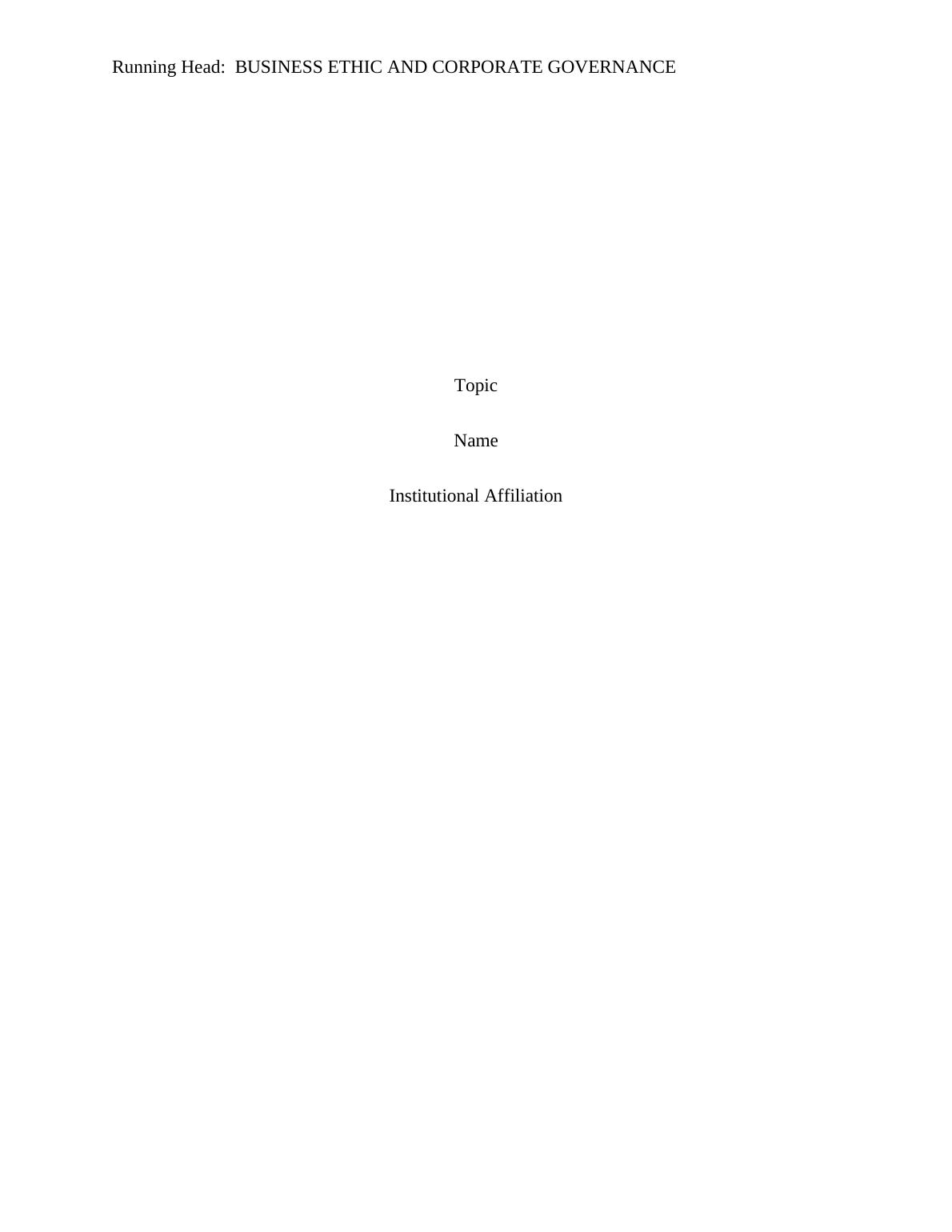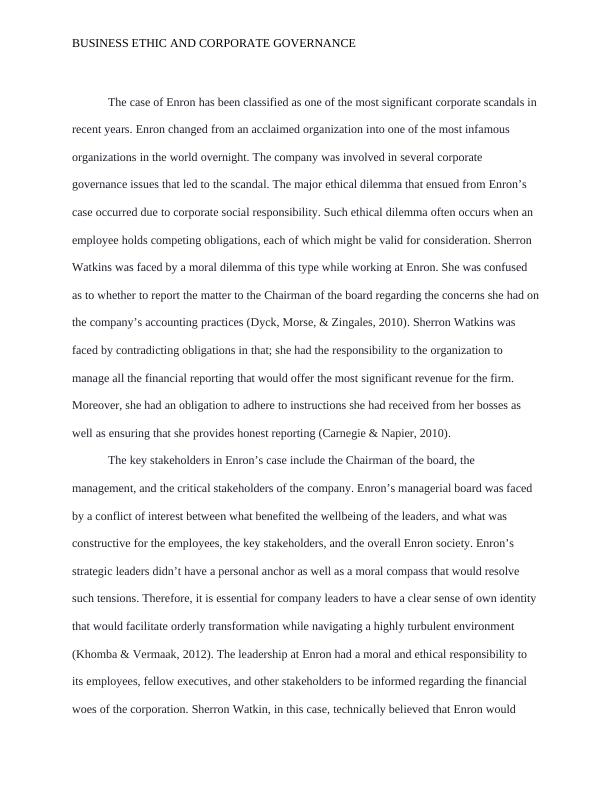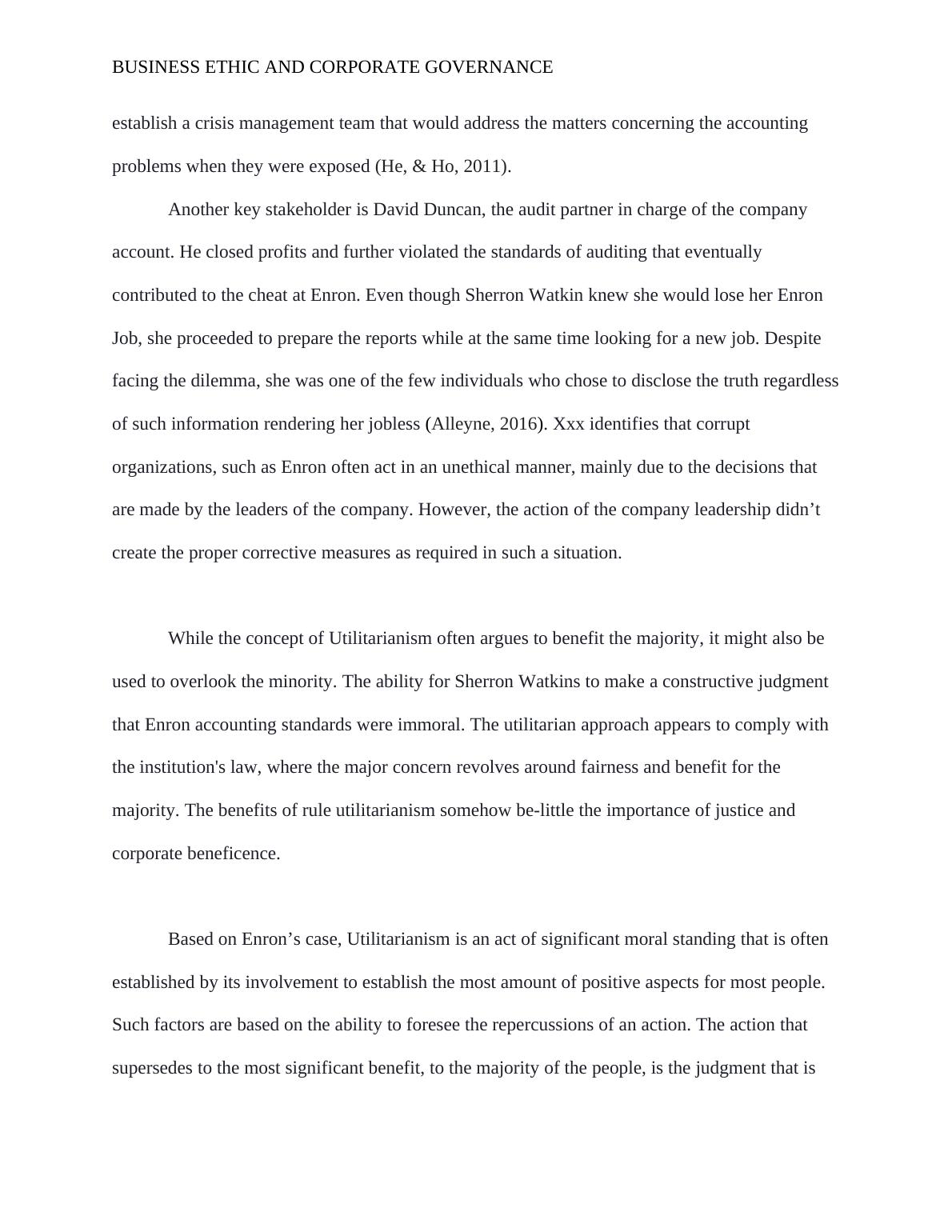Business Ethics and Corporate Governance
Added on 2022-12-19
8 Pages2406 Words1 Views
Running Head: BUSINESS ETHIC AND CORPORATE GOVERNANCE
Topic
Name
Institutional Affiliation
Topic
Name
Institutional Affiliation

BUSINESS ETHIC AND CORPORATE GOVERNANCE
The case of Enron has been classified as one of the most significant corporate scandals in
recent years. Enron changed from an acclaimed organization into one of the most infamous
organizations in the world overnight. The company was involved in several corporate
governance issues that led to the scandal. The major ethical dilemma that ensued from Enron’s
case occurred due to corporate social responsibility. Such ethical dilemma often occurs when an
employee holds competing obligations, each of which might be valid for consideration. Sherron
Watkins was faced by a moral dilemma of this type while working at Enron. She was confused
as to whether to report the matter to the Chairman of the board regarding the concerns she had on
the company’s accounting practices (Dyck, Morse, & Zingales, 2010). Sherron Watkins was
faced by contradicting obligations in that; she had the responsibility to the organization to
manage all the financial reporting that would offer the most significant revenue for the firm.
Moreover, she had an obligation to adhere to instructions she had received from her bosses as
well as ensuring that she provides honest reporting (Carnegie & Napier, 2010).
The key stakeholders in Enron’s case include the Chairman of the board, the
management, and the critical stakeholders of the company. Enron’s managerial board was faced
by a conflict of interest between what benefited the wellbeing of the leaders, and what was
constructive for the employees, the key stakeholders, and the overall Enron society. Enron’s
strategic leaders didn’t have a personal anchor as well as a moral compass that would resolve
such tensions. Therefore, it is essential for company leaders to have a clear sense of own identity
that would facilitate orderly transformation while navigating a highly turbulent environment
(Khomba & Vermaak, 2012). The leadership at Enron had a moral and ethical responsibility to
its employees, fellow executives, and other stakeholders to be informed regarding the financial
woes of the corporation. Sherron Watkin, in this case, technically believed that Enron would
The case of Enron has been classified as one of the most significant corporate scandals in
recent years. Enron changed from an acclaimed organization into one of the most infamous
organizations in the world overnight. The company was involved in several corporate
governance issues that led to the scandal. The major ethical dilemma that ensued from Enron’s
case occurred due to corporate social responsibility. Such ethical dilemma often occurs when an
employee holds competing obligations, each of which might be valid for consideration. Sherron
Watkins was faced by a moral dilemma of this type while working at Enron. She was confused
as to whether to report the matter to the Chairman of the board regarding the concerns she had on
the company’s accounting practices (Dyck, Morse, & Zingales, 2010). Sherron Watkins was
faced by contradicting obligations in that; she had the responsibility to the organization to
manage all the financial reporting that would offer the most significant revenue for the firm.
Moreover, she had an obligation to adhere to instructions she had received from her bosses as
well as ensuring that she provides honest reporting (Carnegie & Napier, 2010).
The key stakeholders in Enron’s case include the Chairman of the board, the
management, and the critical stakeholders of the company. Enron’s managerial board was faced
by a conflict of interest between what benefited the wellbeing of the leaders, and what was
constructive for the employees, the key stakeholders, and the overall Enron society. Enron’s
strategic leaders didn’t have a personal anchor as well as a moral compass that would resolve
such tensions. Therefore, it is essential for company leaders to have a clear sense of own identity
that would facilitate orderly transformation while navigating a highly turbulent environment
(Khomba & Vermaak, 2012). The leadership at Enron had a moral and ethical responsibility to
its employees, fellow executives, and other stakeholders to be informed regarding the financial
woes of the corporation. Sherron Watkin, in this case, technically believed that Enron would

BUSINESS ETHIC AND CORPORATE GOVERNANCE
establish a crisis management team that would address the matters concerning the accounting
problems when they were exposed (He, & Ho, 2011).
Another key stakeholder is David Duncan, the audit partner in charge of the company
account. He closed profits and further violated the standards of auditing that eventually
contributed to the cheat at Enron. Even though Sherron Watkin knew she would lose her Enron
Job, she proceeded to prepare the reports while at the same time looking for a new job. Despite
facing the dilemma, she was one of the few individuals who chose to disclose the truth regardless
of such information rendering her jobless (Alleyne, 2016). Xxx identifies that corrupt
organizations, such as Enron often act in an unethical manner, mainly due to the decisions that
are made by the leaders of the company. However, the action of the company leadership didn’t
create the proper corrective measures as required in such a situation.
While the concept of Utilitarianism often argues to benefit the majority, it might also be
used to overlook the minority. The ability for Sherron Watkins to make a constructive judgment
that Enron accounting standards were immoral. The utilitarian approach appears to comply with
the institution's law, where the major concern revolves around fairness and benefit for the
majority. The benefits of rule utilitarianism somehow be-little the importance of justice and
corporate beneficence.
Based on Enron’s case, Utilitarianism is an act of significant moral standing that is often
established by its involvement to establish the most amount of positive aspects for most people.
Such factors are based on the ability to foresee the repercussions of an action. The action that
supersedes to the most significant benefit, to the majority of the people, is the judgment that is
establish a crisis management team that would address the matters concerning the accounting
problems when they were exposed (He, & Ho, 2011).
Another key stakeholder is David Duncan, the audit partner in charge of the company
account. He closed profits and further violated the standards of auditing that eventually
contributed to the cheat at Enron. Even though Sherron Watkin knew she would lose her Enron
Job, she proceeded to prepare the reports while at the same time looking for a new job. Despite
facing the dilemma, she was one of the few individuals who chose to disclose the truth regardless
of such information rendering her jobless (Alleyne, 2016). Xxx identifies that corrupt
organizations, such as Enron often act in an unethical manner, mainly due to the decisions that
are made by the leaders of the company. However, the action of the company leadership didn’t
create the proper corrective measures as required in such a situation.
While the concept of Utilitarianism often argues to benefit the majority, it might also be
used to overlook the minority. The ability for Sherron Watkins to make a constructive judgment
that Enron accounting standards were immoral. The utilitarian approach appears to comply with
the institution's law, where the major concern revolves around fairness and benefit for the
majority. The benefits of rule utilitarianism somehow be-little the importance of justice and
corporate beneficence.
Based on Enron’s case, Utilitarianism is an act of significant moral standing that is often
established by its involvement to establish the most amount of positive aspects for most people.
Such factors are based on the ability to foresee the repercussions of an action. The action that
supersedes to the most significant benefit, to the majority of the people, is the judgment that is

End of preview
Want to access all the pages? Upload your documents or become a member.
Related Documents
Ethics and Governance - Scandal of Enronlg...
|17
|4220
|18
Leadership and Business Ethics Assignmentlg...
|17
|4756
|25
Enron Fraud Scandal and Ethical Business Governancelg...
|8
|2104
|31
Assurance, Audit and Compliance - Miltonlg...
|13
|4004
|227
Business Law and Ethics: Enron Scandal and Remedieslg...
|8
|1933
|89
Enron Fraud Scandal: A Case of Ethical Corporate Governancelg...
|7
|1933
|45
